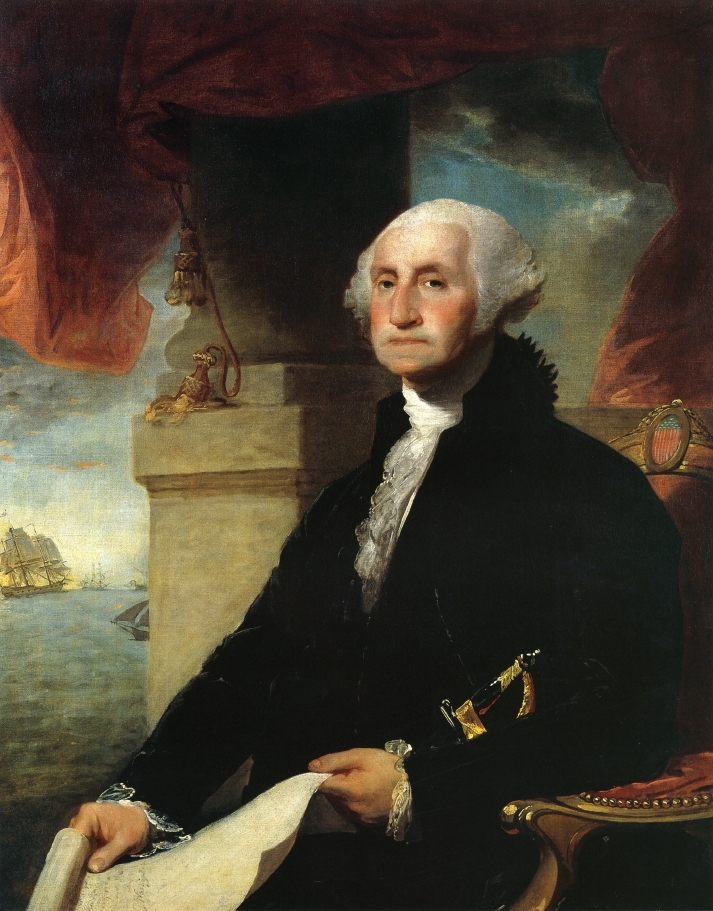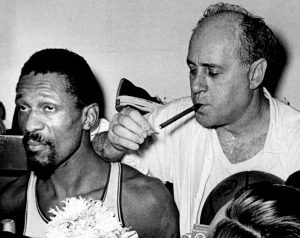“I feel my self going. I thank you for your attention. You had better not take any more trouble about me; but let me go off quietly; I cannot last long.”1 These were George Washington’s dying words. Who could have imagined that this great Revolutionary War hero and first President could fall two years after his retirement? He seemed to be immortal in the public’s eyes. Staying in the spotlight for nearly twenty five years, standing as the symbol of American nationhood, he not only had stood as a symbol of America, but he had also commanded the armies that helped gain national independence. After all the wars, he never appeared fazed, never showed any type of weakness or vulnerability, until that frigid winter of 1799.2
The century was nearly over, and the future of the young nation seemed bright. The former commander-in-chief of the nation had retired to his estate of Mount Vernon and had set out on horseback to check on certain areas of his plantation. It was December 12, 1799.3 He was exposed to cold rain and snow, but that did not stop this man from carrying out his responsibilities. However, sometimes carrying out responsibilities can have serious consequences. The next day he woke early in the morning, having difficulty breathing. Later in the morning he started to developed pain in the throat, and this led him to be unable to swallow or speak well. He grasped for some air, constantly tossing and turning to find a comfortable position.4 Lying down in agony, he was surrounded by three physicians who were all at a loss as to what to do.
James Craik, Gustavus Richard Brown, and Elisha Cullen Dick were the attending physicians for Washington, and all knew him very well.5 The first to arrive was Dr. Craik on Friday, December 13, when Washington started first experiencing a cold with a light hoarseness. By 2 a.m. the next morning, he awoke with troubled breathing. At 6 a.m. he was showing signs of a fever with throat pain and respiratory suffering.6 Washington was unable to swallow and even had difficulty speaking. Dr. Craik believed that the only option for Washington was for a bloodletting.
Bloodletting is the surgical removal of blood from a patient, and it was a typical procedure physicians used in the eighteenth century. Typically, the physicians were not the ones that would carry out the bloodletting; they would call in a skilled bloodletter. In this case, the bloodletter was George Rawlins. At 7:30 a.m., Rawlins removed about 12 to 14 ounces of Washington’s blood. Washington actually requested an additional bloodletting. Two hours later, Dr. Craik applied a blister of cantharides to Washington’s throat and removed roughly 18 more ounces of blood. This was also done at 11 a.m.7 Washington was still alert at this time. He even had the strength to stand up and walk to the bathroom, but he still had trouble swallowing tea, nearly suffocating from the attempt and unable to cough up the fluid.
There was an argument among the physicians caring for Washington, whether there should be a fourth bloodletting. Dr. Elisha Cullen Dick believed that more bloodletting would make Washington’s condition worse. Nevertheless, Dr. Craik ordered for the bloodletting at 3 p.m.8 After the fourth bloodletting, Washington seemed to show improvement; he was able to swallow. With renewed strength, Washington was able to revise his will. He knew his time was coming to an end. As the night continued, his condition steadily worsened. The physicians tried their best to keep him stable by applying blisters of cantharides to his arms, legs, and feet. They even applied wheat-bran cataplasms to his throat.9 This did stop his condition from worsening.

At 10 p.m., Washington whispered his burial instructions to his aide. Twenty minutes later, George Washington died. The news of his death spread rapidly across the country. The grieving was not only at his at burial site, but across the Atlantic. There was a London newspaper that eulogized: “His fame, bounded by no country, will be confined to no age.”10 Units of the British fleet that was blockading a harbor in France dropped their ensigns to half-mast. Napoleon ordered a ten-day requiem.11 In the United States, newspapers would publish poems from grieving women. People traveled to Mount Vernon to pay their respects. Citizens dressed in black clothing for months.12
December 26 was the official day of mourning. At dawn, there were sixteen cannons that were fired, and they continued to boom every half hour until 11 a.m. After the firing of the cannons, there was a march of troops to the Lutheran Church where Henry Lee gave a memorial of Washington that became immortal: “First in war, first in peace and first in the hearts of his countrymen, he was second to none in the humble endearing scenes of private life…The purity of his private character gave effulgence to his public virtues.”13 To pay tribute to the first president, Congress voted to construct a marble monument in the Capital building, which was still under construction in Washington, D.C. at the time. This was an appropriate tribute to a great man, and he will forever be immortal in our nation’s history.
- Salem Press Encyclopedia, January 2016, s.v. “George Washington’s Death.” ↵
- Salem Press Encyclopedia, January 2015, s.v. “George Washington,” by David Curtis Skaggs. ↵
- Salem Press Encyclopedia, January 2016, s.v. “George Washington’s Death.” ↵
- David M. Morens, “Death of a President,” New England Journal of Medicine, vol. 341, (December 1999): 1845. ↵
- David M. Morens, “Death of a President,” New England Journal of Medicine, vol. 341, (December 1999): 1845-1849. ↵
- David M. Morens, “Death of a President,” New England Journal of Medicine, vol. 341, (December 1999): 1845. ↵
- David M. Morens, “Death of a President,” New England Journal of Medicine, vol. 341, (December 1999): 1845. ↵
- David M. Morens, “Death of a President,” New England Journal of Medicine, vol. 341, (December 1999): 1845. ↵
- David M. Morens, “Death of a President,” New England Journal of Medicine, vol. 341, (December 1999): 1846. ↵
- Salem Press Encyclopedia, January 2016, s.v. “George Washington’s Death.” ↵
- Salem Press Encyclopedia, January 2016, s.v. “George Washington’s Death.” ↵
- David M. Morens, “Death of a President,” New England Journal of Medicine, vol. 341, (December 1999): 1846. ↵
- Salem Press Encyclopedia, January 2016, s.v. “George Washington’s Death.” ↵



73 comments
Lianna Ybarra
I really enjoyed reading this article. I had no idea how Washington had died; I knew he was sick but didn’t think it was this bad to where he couldn’t breathe or swallow. It must have been hard to watch a great leader die when they didn’t know what to do for him. Knowing now that even when he was sick and about to die he still fulfilled his duties proves him to be a great leader. I’m glad you picked to write about this because I had no idea how he had died or his last words.
Bailey Rider
This was a fantastic article! Good job Samuel! You’re introduction was really good and hooked me into the story. It’s crazy how Washington died so shortly after his retirement. I cannot fathom how bloodletting was believed to work, and they took so much of Washingtons blood. I wonder if that was a factor that caused him to die so fast and not recover. You did a good job honoring him, great article!
Sergio Cervantes
Great read! There exists one name that everyone identifies with the United States and that is Washington. For some reason you see his name everywhere; it shows how important he was to this country. It must have been a dark day for the new nation considering that they had just lost their “immortal” figure. I must say I do find it interesting that other European nations, including the United Kingdom, paid their respects to this revolutionary hero. It must have been a ceremony to remember with the sound of cannon for each passing hour.
Teresa Valdez
It is hard to imagine that such a legendary figure would die in such an ordinary way. I really admire this article for going into such great detail about George Washington’s death. It is amazing to think about how many lives he touched, all of who paid their respects to him. While it is incredibly sad to think Washington was in much pain leading up to his death, this article reminds us that America’s greatest hero was human too.
Cameron Mays
George Washington was the first president of the United States, thus, we learn quite a lot about him growing up and going through our history classes over the years. Despite this, we don’t cover his death and aftermath that often. You brought this to light, I commend you for this! One key factor into highlighting this aspect of Washington’s legacy, was the research you put into the article. This played a fundamental role in shaping your article to become something not only remotely publishable, but also outstanding!
Hayden Hollinger
I really enjoyed this article. The article was a great read and I especially liked the quote at the start, I thought it was the perfect way to begin: with Washington’s last words. This was an article that I was interested to see how you would develop but I thought you did a great job of it. The painting in the middle of your article was a great choice, and obviously fitted the context ideally.
Jennifer Pogue
Great article Samuel. We all learn about George Washington’s presidency, but I have never learned about his death. It is very sad the way he had to suffer. Throughout his life he was a war hero and the first president, and his life ended because of an illness. I can’t imagine how the citizens of that time felt as their first president passed. The story you told was very well written and I was able to imagine what was happening. Nice job!
Faisal Alqarni
Hi Sanchez, This was an icnic light of the new found lands. I really like how you painted a vivid picture of Washington in his last minutes, this is a good talent. Bloodletting sounds very dangerous I would like to know the science behind it, because back home we do it when someone has been bitten by a snake or desert scorpion. Washington was indeed a great man from your description and that last poem by Hnery Lee was a great ending o the tale of the death of this great icon.
Ana Gonzalez
Nice article! I have heard plenty about George Washington, but never about the reason behind his death. It’s a bit unbelievable that a war hero, someone who played a major role in gaining the USA’s independence, passed away because of a terrible illness. I agree however that Washington is an immortal figure in our nation and will always be mentioned. Your article was interesting and well-written. Thank you!
Tyler Sleeter
Great article, very informative. I would expect for the death of George Washington to be mourned in the United States, but I did not know it was mourned in England and France as well. It seems odd that Britain would mourn the loss of a man that led the war against them. Washington was an accomplished man and it seems fitting that he knew that he was about to die and gave instructions to his aid. The words of Henry Lee are most appropriate for the burial of the first president of our country.